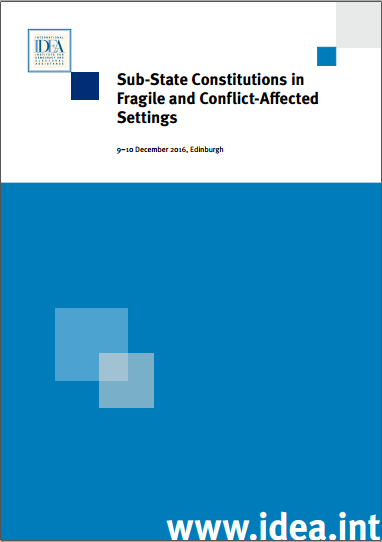Sub-State Constitutions in Fragile and Conflict-Affected Settings: Conference Report
This workshop report follows the Third Edinburgh Dialogue on Post-Conflict Constitution Building that was held at the University of Edinburgh on 9–10 December 2016. This workshop, on ‘Sub-state Constitution Building in Fragile and Conflict-Affected Settings’, was organized by the International Institute for Democracy and Electoral Assistance (International IDEA), the Edinburgh Centre for Constitutional Law and the Global Justice Academy, in association with the Political Settlements Research Programme at the University of Edinburgh. The dialogue explored the process and design of sub-state constitutions in fragile and conflict-affected settings, and their role in the broader political settlement and/or peacebuilding process. This report will feed into a policy paper on sub-state constitutions in fragile and conflict-affected settings, which will be published by the end of 2017.
Sub-state entities are broadly defined here as the constitutive parts, or territorial subdivisions, of a state. They emerge for numerous reasons, all of which are rooted in a country’s history. These sub-state entities sometimes choose (or are required) to adopt their own constitutions; this report examines such sub-state constitutions primarily in fragile and conflict-affected settings. Spain is included as an example of the use of sub-state constitutions, or their equivalent, in a peaceful transition from dictatorship to democracy.
The dialogue employed a qualitative comparative framework using nine case studies, which span unitary to federal states. The case studies helped participants understand different sub-state constitutional designs and processes, and their impact on specific country or regional conflict dynamics.

Comments/Questions?